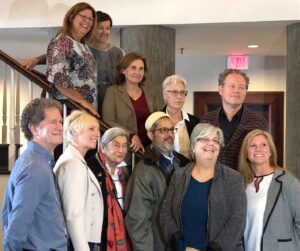
The 2019 NIDCAP Trainer’s Meeting was both illuminative and humanizing and I’ll tell you why.
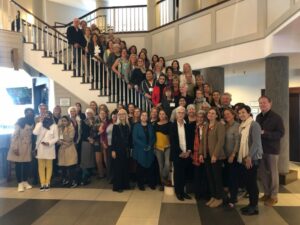
During the opening presentation, a person from each country had a few minutes to introduce themselves to the group and not only share their background, but also a professional success they have celebrated in the last year. This gave all of the conference attendees an introduction as to what our NIDCAP Trainers and Training Centers are working on and how well they are doing it. There were 19 countries represented at this year’s NIDCAP Trainers Meeting.
Wow!
From the US, there were 17 states represented and I was very happy to hear what each state representative had to say. I also want to mention that there were also some NICU parents in the room, and this is a great sign of how the parent voice is being invited to the table in our neonatal healthcare conversations.
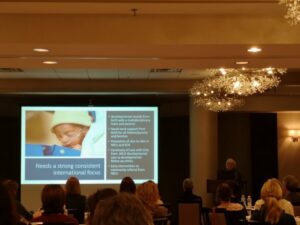
The member portion of the NIDCAP Trainer’s Meeting was on both Saturday and Sunday. The presentations were filled with sharing of accomplishments and strategies to help further the reach of NIDCAP on a global scale.
What is NIDCAP?
So… some of you may be wondering that NIDCAP is. The description is much more than the acronym explanation but I’ll share that first. NIDCAP stands for Newborn Individualized Developmental Care Assessment Program.
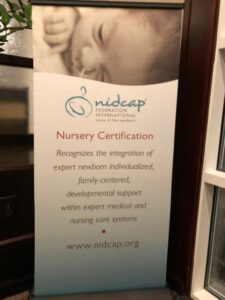
The NFI (NIDCAP Federation International) promotes the advancement of the philosophy and science of NIDCAP care and assures the quality of NIDCAP education, training, mentoring and certification for professionals and hospital system.
NIDCAP is a comprehensive training program created by Heidelise Als, PhD, out of Harvard University. The NIDCAP theory is systems based, and the NIDCAP philosophy assists complex hospital systems in assessing, building, and changing their methodologies of providing care to create whole-system approaches and strategies that are individualized and supportive for both the infant and family.
Although our most premature and medically fragile babies may require technology in order to survive, the way we use this technology to provide care that includes their families can create humane, caring, and brain supportive experiences instead of only stressful, painful ones, filled with trauma.
This is why I love NIDCAP and why I joined them. I am not a neonatologist or NICU nurse or a therapist providing care to newborns, however I am a NICU parent professional who had a baby spend a significant time in a neonatal intensive care unit and I know what happens in that unit and what can happen in that unit. NIDCAP should be in every single neonatal unit.
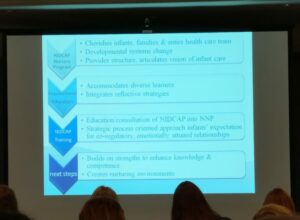
Research indicates that infants who receive NIDCAP or developmental care require less breathing support, fewer days on the ventilator and in oxygen therapy, experience fewer complications, gain weight faster, build stronger and healthier family relationships, and are ready to go home sooner than infants who do not; additionally, this research suggests that these improved outcomes persist far beyond infancy.
The History of NIDCAP
From years of observing infants in the newborn intensive care settings, Dr. Heidelise Als, an internationally-known psychologist and scientist at Boston Children’s Hospital and Harvard Medical School, and her colleagues, pioneered a way to understand how babies communicate. She watched these very small babies ever so closely and noticed changes in their breathing, color, movements, sleep and wakefulness and much more. Dr. Als discovered that their “voice” can be interpreted through their behavior. And that these understandings can be used for comfort and support. This approach is now practiced around the world as NIDCAP.
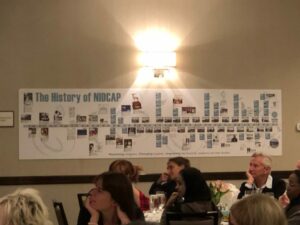
NIDCAP Trainers, Professionals and Supporters have advocated for NIDCAP care for hospitalized newborns.
The Trainer’s Meeting
Now you know a little bit more about NIDCAP so I can share with you how our Trainer’s Meeting went.
Saturday was a sunny day in Portsmouth and it was chilly outside, but we were all warm and cozy in the Sheraton listening to presentations and participating in group activities designed to help us all be better at whatever our roles are in the NICU.
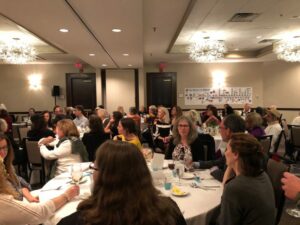
James Helm opened our day with a delightful presentation honoring the 30th Anniversary of NIDCAP. In the last 30 years, NIDCAP has grown to over 20 Training Centers (you can click HERE to see them) and over 50 NIDCAP Trainers. We had representatives from 19 different countries from around the world and 17 states from the USA.
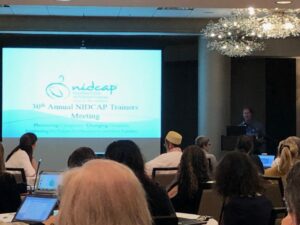 .
. 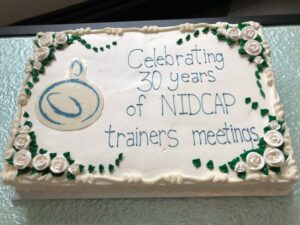
The day’s presenters did not disappoint. We heard from a variety of NIDCAP Trainers and members who are all incredibly dedicated to improving how newborns are cared from the world’s NICUs. These presenters included Juzer Tyebkhan (Canada), Gretchen Lawhon (US), Kaye Spence (Australia), Linda Gelkerson (US), James Helm (US), Jean Powlesland (US), Monique Oude Reimer (Netherlands), Shohei Ohgi (Japan), Nikk Conneman (Netherlands), Fayazah Al Malki (Saudi Arabia), Buenafe Cala (Saudi Arabia), Gloria McAnulty (US), Peggy Settle (US), Dorothy Vittner (US), Linda Lacina (US), and Kathi Frankel (US). The final presentation was more of an activity. Linda Lacina led us in a meditative excursive where we had 12 minutes to breath deeply and relax to shut down our thoughts and prepare for the evening. I really enjoyed this and found myself rested at the end of our day.
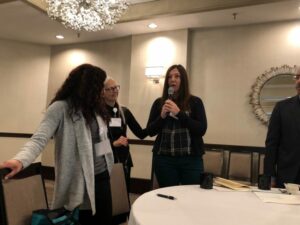
You can click HERE to see the full 2019 NIDCAP Trainer’s Meeting agenda.
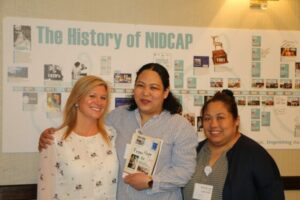
Saturday night was quite exciting. After a long day of meetings and presentations, the NIDCAP group knows how to have a bit of fun. There was dinner and dancing where our attendees were able to let down their hair and socialize together, as well as take some embarrassing photos to be shared at next year’s meeting.


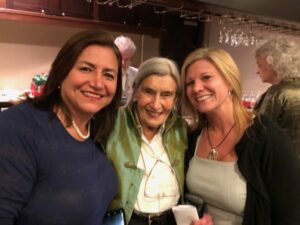
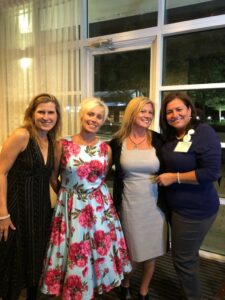
We were back to work on Sunday morning after breakfast. Our speaker’s included Rodd Hedlund (US), Birgit Holzuter (Germany), Natalie Wetzel (Germany), Inge van Herreweghe (Belguim), Monique Oude-Reimer (Belgium), Juzer Tyebkhan (Canada), Ita Litmanovitz (Israel), Kristen James Nunez (Australia), Kaye Spence (Australia), Gillian Kennedy (United Kingdom), Jean Powlesland (US), and Dalia Silbertstein (Israel).
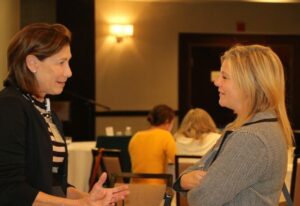
Dinner Sunday night was also great fun! We had a clambake in York, Maine. I cannot say enough about how I love to connect with NIDCAP Trainers and members from all over the globe to learn the similarities and differences in their NIDCAP practices and also their cultures.

Sadly, I had to drive back to New York after dinner Sunday evening and I was not able to attend the Monday sessions. I am a high school science teacher and my students need me in the classroom. It was disappointing to miss the open day of presentations and I am aware that I missed out on learning more about NIDCAP and how it is helping newborns around the world, but I needed to go home to teach.
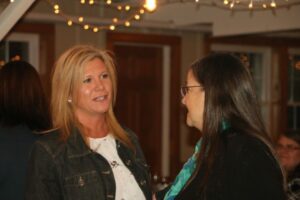
Monday’s theme was particularly interesting to me as I am also a member of The Morgan Leary Vaughan Fund’s Board of Directors. The day was titled “Gut Feeling: The Other Brain. Exploring the Connection of Microbiome, Stress, & Infant Behavior” and the agenda was jam-packed with highly reputable and well-known presenters from several countries.
These presentations included The Connection of Stress, the Mircobiome and Infant Behavior by Amy D’Aagata of the US, Translation into Practice: Nursing Care of the Surgical Neonate by Kaye Spence of Australia, A NIDCAP Observation of Gut-Brain Relations by Jeffery Alberts of the US, Translation into Practice: Using a NIDCAP Lens to Transform Routine NICU Care by Jennifer Hofherr of the US, Translation into Practice: Supporting Families Through Early Feeding Experiences by Stina Klemming of Sweden, Using the NIDCAP Philosophy and Principles in the Implementation of a NICU Book Sharing Program by Linda Lacina of the US, Early Discharge With Home Care Tube Feeding Program Benefits on 2-Years Corrected-Age Neurodevelopmental Outcomes, Breastfeeding and First Year Hospital Readmissions for Premature Babies by Sandra Lescure of France, Supporting Families in the Neonatal Setting- it’s time to get creative by Kristen James-Nunez of Australia, Health Care Professionals’ Beliefs and Perceptions on Family-Centered Care in the NICU by Dorothy Vittner of the US, Oxytocin Release is Strongly Associated with Premature Infant Behavioral Patterns by Dorothy Vittner of the US, Oxytocin Responsivity During Skin-to-Skin Care and Diurnal Cortisol Predict Depression, Trauma and Bonding Scores at NICU Discharge in Parents of Preterm Infants by Bieke Bollen of Belgium, and Filling a Significant Gap in the Cardiac Intensive Care Unit (CICU): Quality Improvement Using the NIDCAP Approach by Samantha Butler of the US.
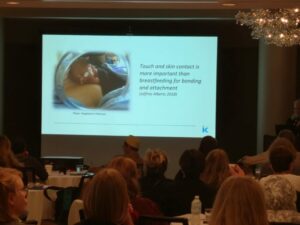 .
. 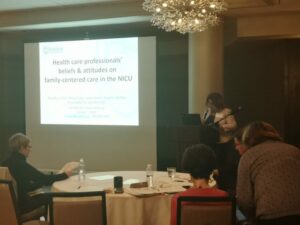
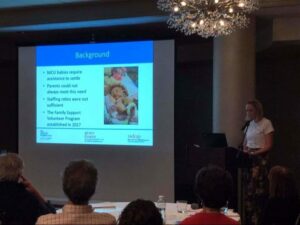 .
. 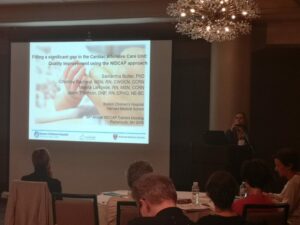
I know that I missed out on quite a bit of learning on Monday, but I had to return to work. Luckily, two other NICU parents were in attendance and were able to share presentation summaries and photos with me. Thank you Mandy Daly (Irish Neonatal Health Alliance) and Yamile Jackson (The Zaky) for catching me up on what I missed.
This is the second NIDCAP Trainer’s Meeting that I have attended and I come away feeling even more impressed than I was after the first one. Each NIDCAP Trainer and attendee is incredibly dedicated to the protecting the neurodevelopmental care of neonates so that they have the best possible outcome. We share that wish and I will continue to participate with the NFI and work to help them as best I can.
Thank you for reading my summary. I encourage you to read more about the NFI and NIDCAP to see if you can model any of their practice in your own and possibly introduce this method to your NICU.
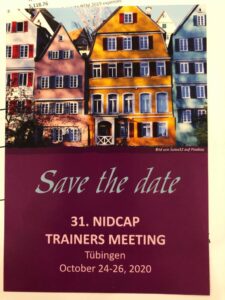
And thank you to Mandy Daly and Fatima Clemente for many of the photos.
